Efforts to Create a Sustainable Society
The Kyowa Kirin Group actively engages in efforts to protect the global environment as a prerequisite for business continuity, and advances activities to realize a sustainable society. Among our materiality, we have positioned climate change (preventing global warming) and those SDGs involved in the protection of water resources, in particular, as core environmental issues. In pursuing business activities, we simultaneously advance initiatives regarding these issues, and promote ongoing efforts to reduce our environmental impact.
Climate Change Mitigation and Adaptation
Policy and Strategy
The Kyowa Kirin Group's policy on climate change is set forth in the Kyowa Kirin Group Environmental Policy, which specifically calls for striving to save resources and energy, and reduce greenhouse gas emissions to prevent global warming.
In 2020, Kirin Group formulated the Kirin Group Environmental Vision 2050 as a new long-term strategy for strengthening social and corporate resilience. In pursuit of “a society that has overcome climate change” that constitutes the society of 2050 that we want to create together with respect to climate change described in the Kirin Group Environmental Vision 2050, Kirin Group has set a target of reducing greenhouse gas (GHG) emissions for the entire value chain to net zero and is working with stakeholders to reduce GHG emissions and take the lead in building a decarbonized society. Kirin Group as a whole has set the more specific medium- to long-term goals of reducing its GHG emissions to 50% of their 2019 levels by 2030 (Scope 1 and 2), joining RE100, and achieving a 100% reliance on renewable energy for electric power by 2040, and it is developing various measures designed to accomplish these.
Kyowa Kirin Group, like the Kirin Group, has also set the goal of achieving net zero GHG emissions for the entire value chain by 2050 in order to realize a "society that overcomes climate change". As more specific medium- to long-term targets, we have set the goals of achieving 100% use of renewable energy for electricity by 2040 and reducing CO2 emissions by 55% by 2030 compared with 2019. Kyowa Kirin Group will help realize this “society that has overcome climate change” by utilizing the Kirin Group’s global network to actively put in place climate change measures that take advantage of the characteristics of its business.
Furthermore, Kyowa Kirin Group has a new vision for 2030. To fulfill this new vision, we have established “retaining the trust of society” as one of the strategies in our 2021-2025 Medium-term Business Plan, with “helping to protect the global environment” being one of the measures to be pursued to that end. Our specific commitments pertaining to climate change include working to reduce CO2 emissions as soon as possible with a particular focus on energy-saving approaches inclusive of capital investment as well as expanded use of renewable energies, and to make an energy transition.
You can see this table by scrolling horizontally.
| Climate Change A society that has overcome climate change. |
Realize Net-Zero GHG emission from the entire value chain
|
|---|
Our Efforts to realize the Kirin Group Environmental Vision 2050
Indicators and Targets
Working toward a "society that has overcome climate change" (2021-2050)
2030 Target
You can see this table by scrolling horizontally.
| Target | CO2 Emissions (SCOPE1,2): 55% Reduction from 2019 Level |
|---|---|
| Target Year | 2030 |
| Base Year | 2019 |
| Results in the Base Year | 51,931 t-CO2 |
| Boundary | Global |
By 2030
Our Group has collaborated with Kirin Holdings to set and pursue a target of reducing CO2 emissions by 20% from their FY2015 levels to 289,000 tons or lower by FY2030 based on Science Based Targets (SBT), using an indicator that combines our pharmaceutical business (Kyowa Kirin Group) and our bio-chemical business (Kyowa Hakko Bio Group). This target was revised in 2021 in response to growing social demand for addressing climate change in the face of increasingly serious climate change. A new target just for our Group was set based on the SBT 1.5°C target: a 55% reduction in emissions from 2019 levels. In addition, we have created a roadmap for achieving this goal and set a short-term target of reducing CO2 emissions by 51% from their FY2019 levels by FY2024).
Short-term target
You can see this table by scrolling horizontally.
| Target | CO2 Emissions (SCOPE1,2): 51% Reduction from 2019 level |
|---|---|
| Target Year | 2024 |
| Base Year | 2019 |
| Results in the Base Year | 51,931 t-CO2 |
| Boundary | Global |
We will undertake continuous energy-saving activities, including capital investment, through 2030 while taking advantage of the fact that most of the energy our business uses is electricity to accelerate the introduction and expansion of renewable energy and achieve effective CO2 emission reductions, and we will review the roadmap every year to verify the effectiveness of our measures in achieving our target. Specifically, our Group will implement the following measures.
- We will be seeking to make equipment improvements by introducing energy-saving air-conditioning equipment, putting the latest energy-saving equipment in new buildings and installing spot air conditioning as well as by undertaking necessary capital investment, in addition to “software” improvements in refrigeration machine control and air-conditioning management.
- We also intend to gradually switch over to renewable energy sources for the electricity used at major sites in Japan by 2025. By 2030 we plan to have introduced and expanded renewable energy use to all our Group’s sites, including overseas business locations and domestic branch offices.
- We are planning to install a solar power generation system at the Ube Plant based on the on-site PPA model, and to put this system into operation in 2023.
- We have installed a large-scale solar power generation facility at the Ube Plant based on the on-site PPA (Power Purchase Agreement) model, and put this system into operation in March 2023.
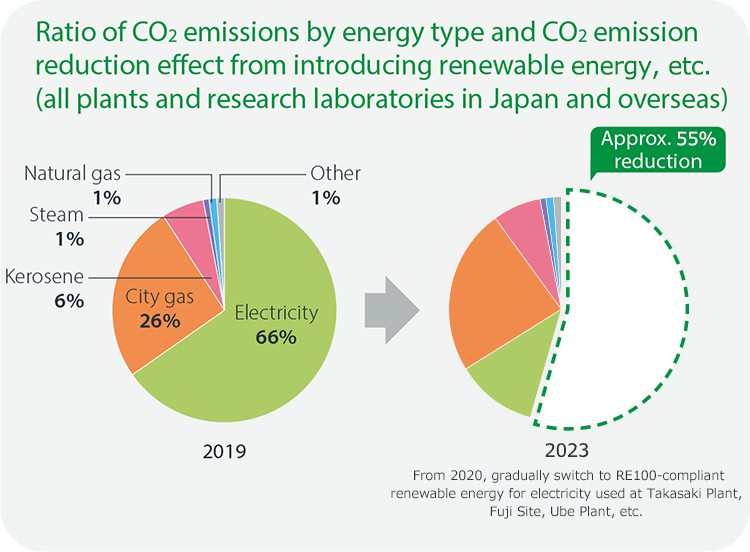
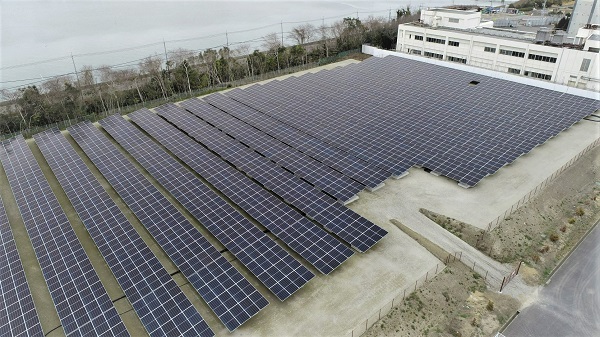
Targets for single fiscal year (actual results for FY2023)
In 2023, we endeavored to reduce CO2 emissions to achieve our 2030 target*1 and to reduce our energy intensity by 1% or more from the previous year.
In 2023, RE100-compliant renewable energy had been introduced at the Ube Plant, and a large-scale solar power generation facility (1.47 MW) based on the on-site PPA model is in operation. The implementation of these measures has resulted in a significant reduction in CO2 emissions. For details, please refer to "Major Initiatives: Promoting the Introduction of Renewable Energy" below.
Furthermore, we have set annual energy intensity reduction targets for each site, and have deployed measures to increase production efficiency. Energy intensity in FY2023 was 6.4% lower than in the previous year (global target: 1% reduction year-on-year), a significant improvement over the target.
As a specified business operator under the Act on the Rational Use of Energy, we are obligated to make efforts to reduce energy intensity by an average of 1% per year, and we have maintained an S-class rating (target achievement) for 5 consecutive years under the Act on the Rational Use of Energy’s business operator classification system (SABC Evaluation System).
Various data on CO2 emissions are available in the ESG Data Collection.
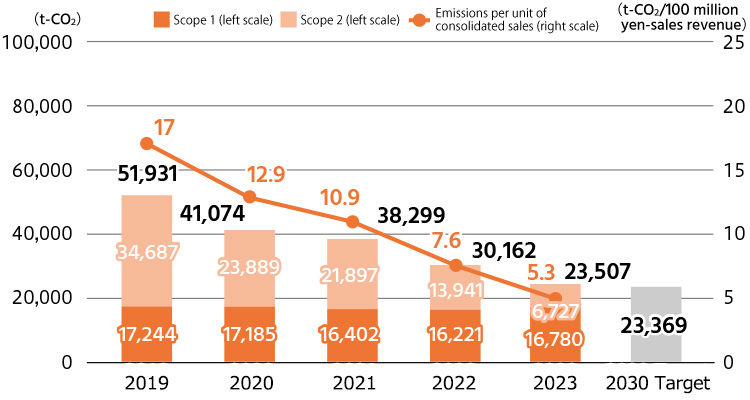
CO2 emissions (Scopes 1+2)*1
You can see this table by scrolling horizontally.
| Target | CO2 Emissions (SCOPE1,2): 55% Reduction from 2019 Level |
|---|---|
| Target Year | 2030 |
| Base Year | 2019 |
| Results in the Base Year | 51,931 t-CO2 |
| Results in 2023 | 23,507 t-CO2 |
| Achievement Status | Achieved by a 55% reduction |
- *1:This covers the production and research sites of the Kyowa Kirin Group.
- *2:IFRS consolidated sales figures are used for calculating intensity.
By 2050
While continuing the above-mentioned measures through 2030, we will be pursuing an energy transition away from fossil fuels with the aim of net zero CO2 emissions for the entire value chain.
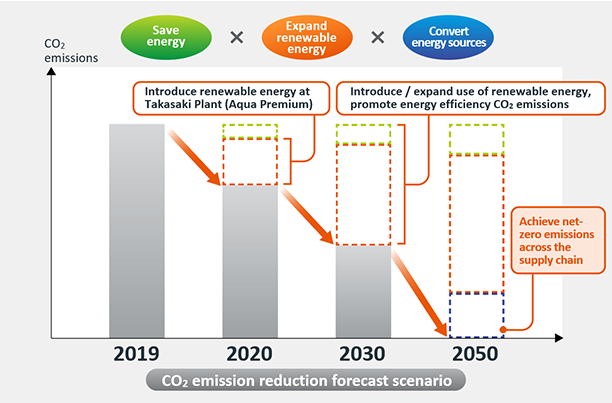
Specific Initiatives
Promotion of Renewable Energy Introduction
In an effort to promote the wider use of renewable energy, Kyowa Kirin has been installing solar power generation facilities since 2011. As of 2023, the Takasaki Plant, Tokyo Research Park, Fuji Site and etc. have solar power generation systems in operation, generating a total of 190,000 kWh of solar power and reducing CO2 emissions by 104 tons*1.
In March 2023, we have introduced and began operating a large-scale solar power generation facility (1.47 MW) based on the on-site PPA model at the Ube Plant, contributing to a significant reduction in CO2 emissions.
In the meantime, we have been gradually introducing RE100-compliant renewable energy at the Takasaki Plant and Fuji Site since 2020, switching 100% of the electricity at each site to renewable energy*2,3. In April 2023, we have introduced this system at the Ube Plant, and switched 100% of the electricity used at this plant to RE100-compliant renewable energy*4. By introducing these renewable energies, in FY2023 approximately 65,400,000 kWh of the Kyowa Kirin Group‘s annual electricity consumption of approximately 78,000,000 kWh was switched to renewable energy sources with zero CO2 emissions, and together with the reduction effects of various energy-saving measures, this has reduced approximately 55% (approximately 28,300 tons) of the Group’s annual CO2 emissions*5 . In 2021, RE100-compliant renewable energy was also introduced for the electricity of the head office*6.
We plan to push forcefully ahead in introducing and expanding renewable energy use to achieve our 2030 target.
Going forward, the plan is for us to have switched to 100% renewable energy at our major sites in Japan by 2025, and to all of our group sites, including overseas sites and domestic branch offices, by 2030. In addition, we will continue to expand the installation of solar power generation facilities at production and research sites in Japan and overseas.
- *1:Calculated as indirect emissions when electricity is purchased
- *2:
- *3:
- *4:
- *5:Calculated based on FY2019 data for Kyowa Kirin Group’s plants and research laboratories in Japan and overseas.
- *6:Otemachi Financial City Grand Cube, the building housing the Kyowa Kirin head office, is powered by electricity derived from renewable energy sources that comply with RE100.
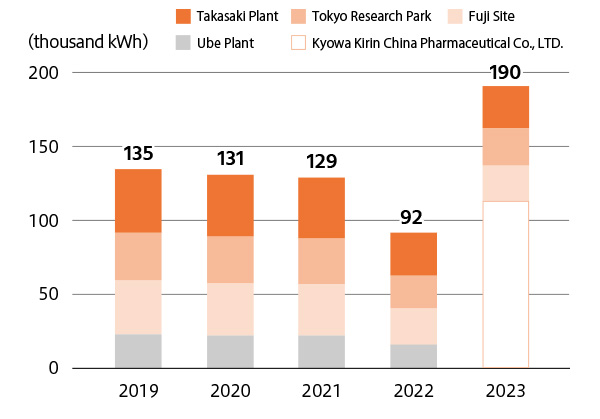
Replacing Company Vehicles with Hybrid Cars
Kyowa Kirin Group has been replacing its commercial vehicles from conventional low-emission certified vehicles to hybrid vehicles in phases since 2009. Starting in 2019 onward, all newly introduced domestic sales vehicles (company vehicles) are equipped with hybrid cars, resulting in the completion of the introduction of hybrid cars in all domestic sales vehicles (achieving a 100% hybrid car adoption rate) as of the end of FY2023. We have thus reduced the amount of fuel used for sales activities and cut our CO2 emissions. At the same time, we have continued to make significant reductions in CO2 emissions by implementing new information provision activities such as web-based interviews, information sessions and lectures. We will consider the relationship between information provision activities and the environmental impact and proceed with efforts toward the realization of a low-carbon corporate group.
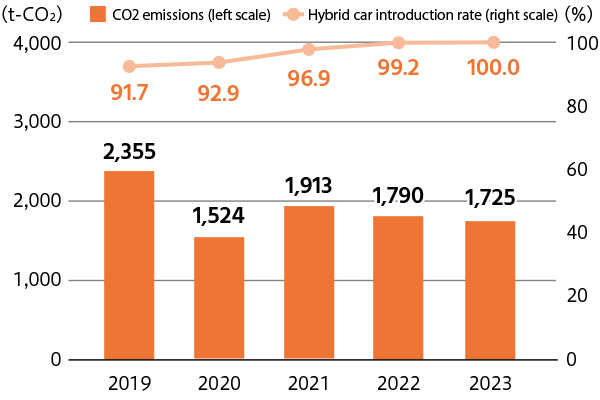
Advancing Green Office Plan
At Kyowa Kirin Group, as part of its ISO 14001-based environmental activities across all back office divisions, the head office, plants, research laboratories, and sales offices promote the Green Office Plan (GOP) in cooperation with the labor union, administrative and procurement divisions, and others. As a result, our green purchasing ratio in FY2023 was 91%, meeting our target. We have introduced a mechanism for actively purchasing eco-friendly products by changing our purchasing system. Since FY2020, we have continued to study and develop approaches to optimize telework and other work styles in view of the growing COVID-19 pandemic. In FY2023, electricity consumption per employee consequently falling by 16.6% from the previous year. At the same time, the amount of copy paper used was 1% lower than the average of the past three years. Going forward, we will promote work style reform and continue to implement suitable measures.
Targets under Green Office Plan
- Reduce per-unit electricity consumption by 1% a year
- Secure green purchasing rate of at least 90%
- Reduce per-unit copier paper consumption by 1% a year (vis-à-vis average consumption in past three years)
Response to, and Support for, Public Regulations
We support laws, regulations and policies pertaining to climate change and reduced energy consumption at all our business locations inside and outside Japan (e.g., the Act on Promotion of Global Warming Countermeasures (“Global Warming Act”) and the Act on the Rationalization etc. of Energy Use (“Energy Saving Act”) in Japan) and take appropriate measures to comply with them.
In addition, we are a Specified Business Operator under the Energy Saving Act, and we are thus obliged to try for an average reduction in unit energy consumption of 1% per year. Every year, we have achieved reductions in unit energy consumption by setting unit energy consumption reduction targets for individual sites and implementing various energy-saving measures. We have maintained an S-class evaluation (target achieved) under the Energy Saving Act’s business operator classification system (SABC evaluation system) for 5 years running.
Connections to Industry Groups and Initiatives
Industry Groups
We are a member of the Federation of Pharmaceutical Manufacturers' Associations of Japan (FPMAJ) and its affiliate the Japan Pharmaceutical Manufacturers Association (JPMA). Both the FPMAJ and the JPMA are taking part in the "Carbon Neutrality Action Plan” (formerly “Commitment to a Low Carbon Society”) developed by the Japan Business Federation. We support the Carbon Neutrality Action Plan and we have been participating in Carbon Neutrality Action Plan (Phase II)* with a target year of 2030.
We are also participating as a member in the activities of the Carbon Neutrality Action Plan Working Group (formerly the Low Carbon Society Action Plan Working Group) established by the FPMAJ. We serve as a member on the newly established Environmental Issue Committee of the Japan Pharmaceutical Manufacturers Association (JPMA). Through these activities, we are indirectly lobbying the government by reflecting our views in industry groups' policy recommendations on climate change issues, such as formulating CO2 emission reduction targets.
To ensure consistency with the stances of industry groups on climate change strategies, we are participating and gathering information in seminars on climate change hosted by the Ministry of Economy, Trade and Industry, the Ministry of the Environment, the Ministry of Health, Labour and Welfare and other government organizations as well as in seminars sponsored by industry groups. We are also taking part as members in a variety of relevant groups to discuss climate change issues and share the content of these discussions internally. We check that this content is in line with our own positions and approaches, and any discrepancies are taken up with the in-house organizations responsible for environmental management and then coordinated via the Group CSR Committee chaired by the Representative Director and Executive Vice President. Through this process, we are aligning our climate change strategies with industry group activities.
- *The targets set by the Carbon Neutrality Action Plan are as follows.
Phase II: Reduce CO2 emissions by 46% from FY2013 levels no later than FY2030.
Initiatives
Kirin Holdings Co., Ltd. joined RE100* in 2020 and thereby committed to switching to 100% renewable energy use by 2040. Our Group's climate change measures are consistent with those of Kirin Holdings, and our Group will also be working to introduce renewable energy in order to fulfill this commitment. In July 2022, Kirin Holdings became the first food company in the world to be certified as "SBT Net Zero" by the SBT Initiative. The certification was granted on the grounds that the long-term goal of "reducing GHG emissions throughout the value chain to net zero by 2050" set forth in the Kirin Group Environmental Vision 2050 is a scientifically-based goal that is consistent with the level of GHG emission reductions required by the Paris Agreement. Kirin Holdings has obtained certification of its SBT 1.5°C target as well, and our Group’s 2030 target has been set to conform to these.
- *An international environmental initiative comprising companies aiming to derive 100% of their electric power from renewable energy sources.
AB1305 Disclosure(Assembly Bill No. 1305)
AB1305 DisclosureWater Resources Management
Policy and Strategy
Water is an important resource that is indispensable for manufacturing pharmaceutical products. However, global water cycle abnormalities, intertwined with climate change and other problems, cause regional disasters such as droughts and floods.
In keeping with the Kyowa Kirin Group Environmental Policy, Kyowa Kirin Group is endeavoring to save water and conserve water sources in pursuit of a “society that values sustainable water resources", depicted as the society we want to create by 2050 in the Kirin Group Environmental Vision 2050.
You can see this table by scrolling horizontally.
| Water Resources A society that values sustainable water resources. |
Bring water, used as a raw material, to a sustainable state
Solve problems with water in a way that suits the characteristics of basin regions where our business bases are located
|
|---|
Our Efforts to realize the Kirin Group Environmental Vision 2050
Kirin Group Environmental Vision 2050![]()
Kyowa Kirin Group Environmental Policy
The Kyowa Kirin Group Environmental Policy calls for water consumption to be reduced and waste reduced and recycled.
Risk Management
Addressing Water Risks
Kyowa Kirin Group assesses the water risks (water shortage, water stress, flooding, water source contamination risk assessments) faced by its production sites on a five-point scale*?based on their water consumption data, water risk assessment tools (WRI Aqueduct and WWF Water Risk Filter), and Internet/questionnaire surveys.
It was found as a result that the Ube Plant (Yamaguchi Prefecture) was at higher risk than other production sites (4 on a 5-point scale). The Ube Plant takes its water from the Koto River, which is frequently subject to droughts, and a hazard map created by the city of Ube where the plant is located predicts flooding of up to five meters due to storm surges. As for our mainstay Takasaki Plant inundation damage was envisioned using the latest site-specific inundation simulation conducted by the Ministry of Land, Infrastructure, Transport and Tourism.
Based on these findings, we are working to avoid and minimize these risks by adopting “software” measures such as reviewing and formulating large-scale natural disaster BCPs at sites, as well as “hardware” measures aimed at inundation prevention (e.g., geographically distributing the storage of important production-related assets, waterproofing buildings, installing key equipment on off-ground floors or on high ground, and installing tide embankment) to avert damage to the equipment itself.
The total water intake at the Ube Plant determined by the water risk assessment to be subject to high risk of water shortages and water stress, for FY2023 was 76,000 tons, amounting to about 5.3% of the Kyowa Kirin Group’s total water intake of 1,433,000 tons. However, the intake of high-quality fresh water needed for operation by Ube Plant is currently sustainable, and the business activities of this plant are not adversely affected by water shortages and water stress.
Furthermore, the Ube Plant works to promote groundwater recharge in the water intake area through its annual "Water Source Forest Activity."
- *Water risk assessment result
You can see this table by scrolling horizontally.
| Name of site | Water shortage Water stress |
Flooding | Water source contamination | Overall risk |
|---|---|---|---|---|
| Takasaki Plant | Low | Low | Very Low | Low |
| Fuji Site | Medium | Very Low | Very Low | Low |
| Ube Plant | High | High | Very Low | High |
| Kyowa Iryo Kaihatsu Co., Ltd. | Low | Low | Very Low | Low |
Assessment indicator: Very High, High, Medium, Low, Very Low
Indicators and Targets
We have heretofore been pursuing a 2030 target of reducing water usage (water intake) by 30% from 2015 levels as a combined indicator for the pharmaceutical business (Kyowa Kirin Group) and the biochemical business (Kyowa Hakko Bio Group) to promote specific water-saving activities. In future, we will only be managing water intake in our pharmaceutical business to develop measures more closely tailored to the characteristics of our business to achieve reduced water intake, and in 2021 we set a new target of cutting water intake in Kyowa Kirin Group by 40% from 2019 levels no later than 2030.
We are also working to improve the efficiency of water use by setting and managing yearly unit water intake targets for individual sites. In 2023, Kyowa Kirin Group achieved a 9.0% year-on-year reduction in water intake.
You can see this table by scrolling horizontally.
| Target | Water Intake: 40% reduction from 2019 level |
|---|---|
| Target Year | 2030 |
| Base Year | 2019 |
| Results in the Base Year | 2,229,000 m3 |
| Boundary | Global |
Specific Initiatives
Efficient Use of Water
Kyowa Kirin Group is working to improve the efficiency of water use in its manufacturing processes. We are striving to reduce the amount of water we use by recycling and reusing water. More specifically, we are improving the quality of cooling tower cooling water, changing and optimizing drainage blow settings, and optimizing scrubber makeup water settings.
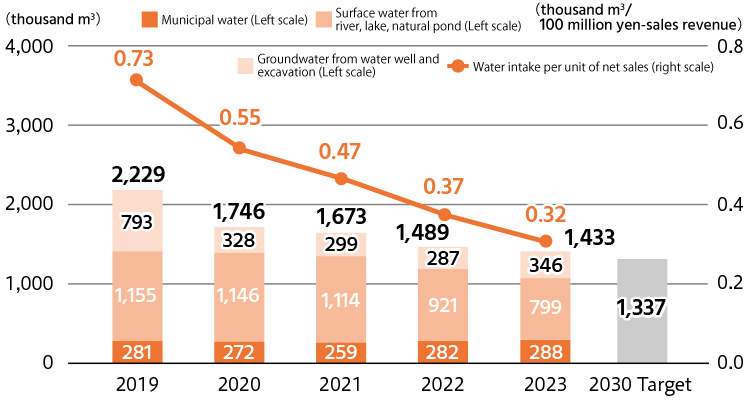
You can see this table by scrolling horizontally.
| Target | Water Intake: 40% reduction |
|---|---|
| Target Year | 2030 |
| Base Year | 2019 |
| Results in the Base Year | 2,229,000 m3 |
| Results in 2023 | 1,433,000 m3 |
| Reduction Rate from Base Year | 36% reduction |
- *1:This data covers the plants and research laboratories of Kyowa Kirin Group.
- *2:IFRS consolidated sales are used to calculate the intensity.
Appropriate Drainage Management
We generated 1,027,000 m3 of wastewater in 2023, 911,000 m3 of which was drained into rivers. We have set voluntary management standards for draining water into rivers that are stricter than the drainage standards set by the competent government authorities, and we are constantly monitoring to prevent discharges of harmful substances and high-load wastewater. Specifically, Kyowa Kirin Group is aggressively upgrading its manufacturing processes and making capital investments in wastewater treatment facilities, and we have continued to reduce COD (chemical oxygen demand), nitrogen, and phosphorus, all wastewater pollution indicators. We are working to prevent water pollution by optimizing wastewater treatment for all types of wastewater, monitoring treatment status, and extracting metal-containing wastewater for industrial waste treatment to prevent discharges of high-load and toxic substances in wastewater.
We were not subject to any fines, legal orders, or other penalties for violating water intake/drainage- or other water-related regulations in 2023.
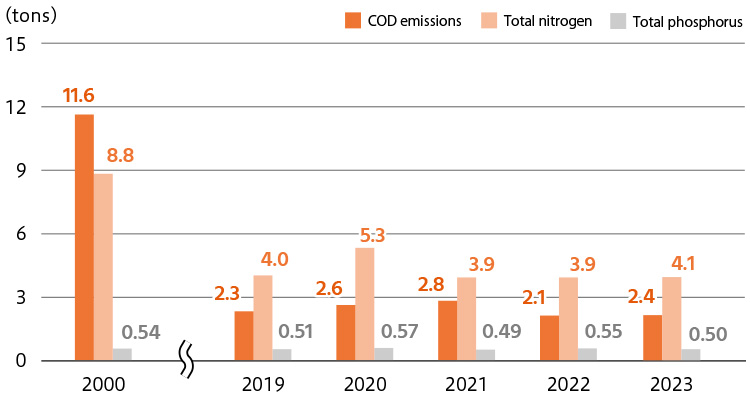
- *1:This data covers Kyowa Kirin Group’s plants and research laboratories in Japan.
Proper waste management and the creation of a resource-recycling society
Governance
The Kyowa Kirin Group's Basic Environmental Policy clearly states, "We strive to reduce waste disposal and promote recycling to contribute to achieving a recyclable society“. In order to create a resource-recycling society, we are strengthening our waste management system and promoting various initiatives to reduce the amount of waste generated and to recycle waste.
Our Group makes it a rule to not only audit waste disposal service providers upon concluding contracts with them, but also to conduct periodic audits to check that their services are of high quality in order to help prevent illegal dumping. In addition, Group-wide efforts are made to enhance awareness of waste governance, such as by providing waste management personnel with ongoing education. We have also set new recycling targets to ensure that we continue to promote resource recycling in the future.
Indicators and Targets
Promote a resource-recycling society
To realize a resource-recycling society, the Kyowa Kirin Group has set a recycling rate target for plastic waste of 65% (by 2030)*1,2 and is considering and developing various measures.
Zero Emission Activities
Waste generated across the entire Kyowa Kirin Group’s sites in Japan*1 reached 1,223 tons in 2023. The final landfill disposal volume was reduced to 0.07 tons in 2023, accounting for 0.006% of the waste generated. Zero emission*2 was therefore achieved. We will continue with our efforts to reduce waste.
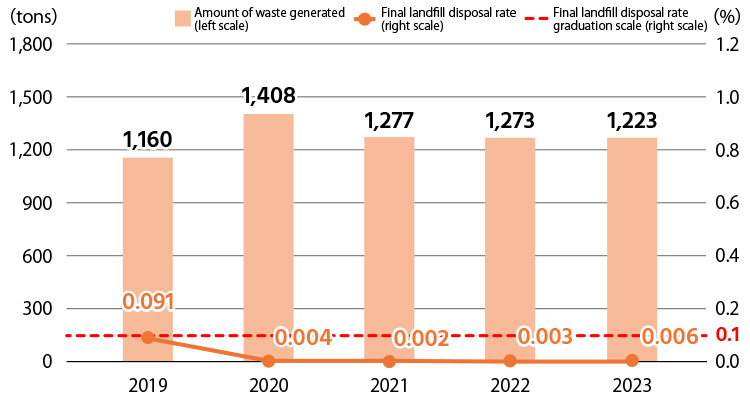
Changes in waste volume and final landfill disposal rate*1
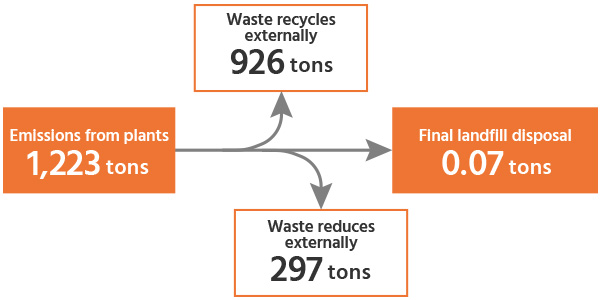
Overall flow of waste recycling and disposal (FY2023)*1
- *1:The plants and research laboratories of Kyowa Kirin Group in Japan are covered.
- *2:The recycling rate is defined as "the total amount of waste sold for value and recycled divided by the amount of waste generated". The amount of waste that is simply incinerated for thermal recovery is not included in the recycling rate.
- *3:“Zero emission”: Kyowa Kirin Group uses the term to mean a reduction in the amount of waste disposed in landfills to no more than 0.1% of generated waste.
Proper Treatment of Polychlorinated Biphenyls (PCBs)
Regarding the proper disposal of PCBs, we have completed the disposal of high-concentration PCB waste such as condensers, transformers, circuit breakers, and lighting ballasts used in the past in accordance with laws and regulations by the deadline.
Low-concentration PCB waste is stored in accordance with the storage standards for specially controlled industrial waste, locked in a warehouse with underground seepage prevention, and disposed of in accordance with laws and regulations by the deadline.
You can see this table by scrolling horizontally.
| Capacitor/transformer/circuit breaker | 0 unit |
|---|---|
| Lighting ballast | 0 unit |
| Low-concentration waste | 84㎏ |
(Stored amount as of end of December 2023)
Initiatives to Reduce Chemical Emissions
Indicators and Targets
In striving to reduce emissions of chemical substances, the Kyowa Kirin Group has focused its activities on reducing emissions of volatile organic compounds (VOCs).
As a result, the Kyowa Kirin Group's overall domestic VOC emissions remained at a very low level of 0.03 tons as of 2023. We will continue with our efforts to modify our production processes to eliminate the use of VOCs and, when installing new facilities using VOCs, to concurrently install highly efficient VOC removal facilities.
The total emission of Class I designated chemical substances of the entire Kyowa Kirin Group in Japan in 2022 under the PRTR Act was 0.02 tons (0.04 tons in the previous fiscal year), which remains at a low level. We are also appropriately managing chemical substances other than PRTR Act-designated Class I chemical substances in compliance with relevant laws and regulations. We will continue our efforts to control chemical substance emissions.
You can see this table by scrolling horizontally.
| Indicator | Unit | Scope of Coverage | 2019 | 2020 | 2021 | 2022 | 2023 |
|---|---|---|---|---|---|---|---|
| VOC Emissions | t | Domestic | 0.05 | 0.07 | 0.04 | 0.09 | 0.03 |
| VOC Emission Intensity | t/100 billion yen (sales revenue) | Global | 0.01 | 0.02 | 0.01 | 0.02 | 0.01 |
| Ozone Depleting Substance (ODS) Emissions | t | Domestic | 0.005 | 0.003 | 0.018 | 0 | 0 |
| PRTR Substance Emissions | t | Domestic | 0.02 | 0.03 | 0.03 | 0.04 | 0.02 |
Details on emissions of PRTR Act-designated Class I chemical substances are available in the ESG Data Collection.
Initiatives to Prevent Air Pollution
Indicators and Targets
Kyowa Kirin Group is taking rigorous measures to switch fuel sources for boilers and make capital investments to maintain emissions of sulfur oxides (SOx), nitrogen oxides (NOx) and dust, which are indices of air pollution, at low levels.
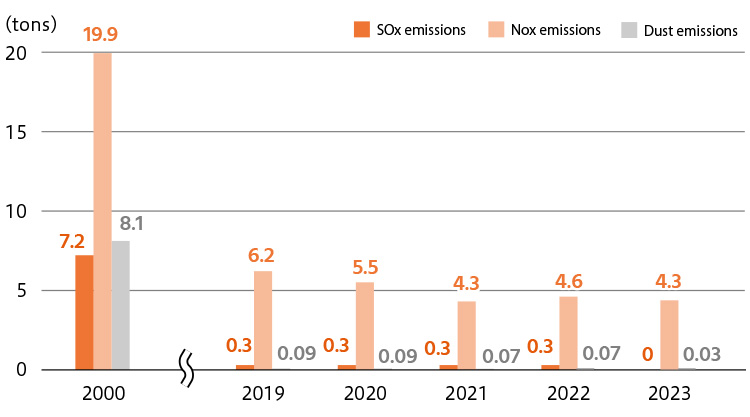
- *1:In Japan, the plants and research laboratories of Kyowa Kirin Group are covered.
Initiatives for Biodiversity Preservation
Activities to Preserve Water-source
Preserving the water resources that sustain the interconnection of lives helps maintain the ecosystem and preserve biodiversity.
As part of its activities to conserve the ecosystem and biodiversity, Kyowa Kirin Group has been endeavoring to preserve water by engaging in the Kirin Group’s water-source preservation project since FY2007. The Takasaki Plant, the mainstay plant for pharmaceuticals, and the Ube Plant perform weeding and tree thinning every year in an effort to preserve forests that provide water resources.
The Takasaki Plant entered into a three-party agreement with Gunma Prefecture and Kurabuchi Furusato Public Corporation, under which it has been engaging in the Kyowa Kirin Takasaki Water Source Forest Conservation Activities. In addition, our activities for over 10 years were recognized as the efforts to preserve and nurture green forests in Gunma Prefecture. As a result, Kyowa Kirin received the Gunma Prefecture Environmental Award (Environmental Achievement Award) in 2018.
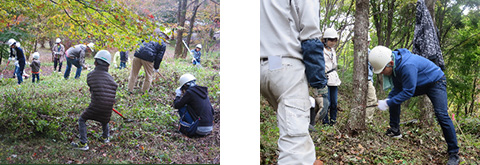
Activities to Preserve Biodiversity
Kyowa Kirin Group has been engaged in a variety of activities through its respective business sites to preserve the ecosystem in collaboration with local communities. Specific examples include cleaning the local river (Kise River, Shizuoka Prefecture; Sakai River, Tokyo), releasing young amago trout into a river (Momozawa River, Shizuoka Prefecture), and preserving grasslands (Akiyoshidai, Yamaguchi Prefecture). The fuji site has been cleaning up the nearby Kise River through Shizuoka Prefecture’s River Friendship Program in collaboration with Numazu civil engineering office and Nagaizumi Town. The Tokyo Research Park has been participating in its local Sakai River cleaning program as a co-sponsor as part of its efforts to help solve the issue of plastic waste under the Kirin Group Plastic Policy. We will continue to foster local communities and raise awareness of beautification and conservation of the natural environment through these activities.
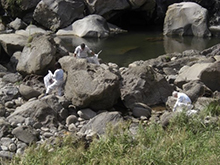
We comply with the Kirin Group’s Guidelines on Access to Genetic Resources in gaining access to raw materials and specimens and sharing the benefits arising out of their use with local communities that provide them.
Furthermore, to comply with the Act on the Conservation and Sustainable Use of Biological Diversity through Regulations on the Use of Living Modified Organisms (Cartagena Act), we have put in place an internal committee to conduct proper management.
Activities to Protect Forests
The Kirin Group Action Plan for the Sustainable Use of Biological Resources declares that the Group will be using paper confirmed to be from sustainable sources for 100% of paper containers and packaging by 2030, with all other paper being recycled paper or paper whose production has been verified as taking sustainability into consideration, and the Kyowa Kirin Group has been introducing FSC®-certified products* under this plan.
At Kyowa Kirin, we are using our procurement activities to help protect the world’s forests. Specifically, we have adopted FSC®-certified products for materials such as company envelopes, company brochures, and cardboard product packaging. In accordance with the Kirin Group Action Plan for Sustainable Use of Biological Resources, which was revised in 2021, we continue to study applications for FSC®-certified products. In addition to expanding their use for domestic product packaging cardboard boxes, we are considering using them for materials such as product inner boxes. We are also considering the use of FSC®-certified products overseas, at business sites and for products.
- *:FSC® (Forest Stewardship Council®) certification is an international certification system for responsibly managed forests and responsible sourcing of forest products that are environmentally conservative, socially beneficial, and economically sustainable.
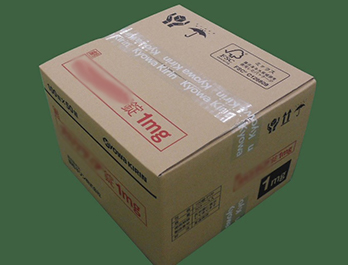
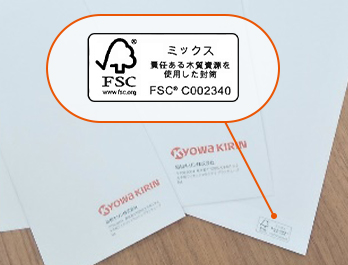
Kyowa Kirin has acquired FSC® promotion license (FSC® N003037).